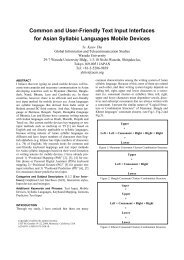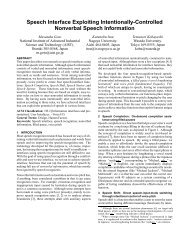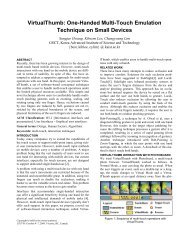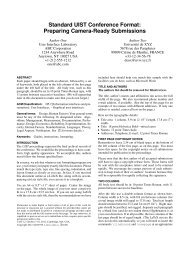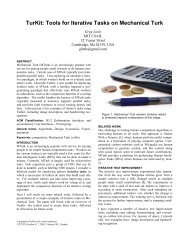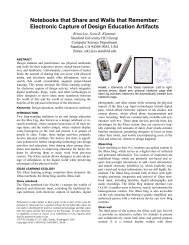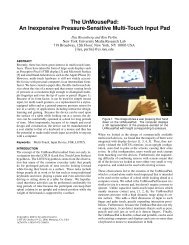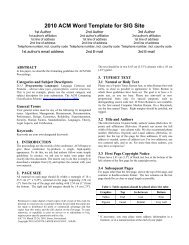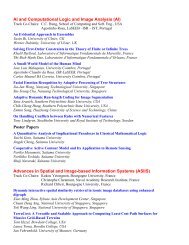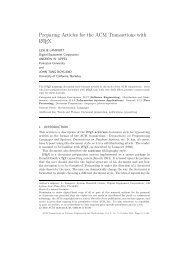API Design Matters Stonebraker and Seltzer - RabbitMQ
API Design Matters Stonebraker and Seltzer - RabbitMQ
API Design Matters Stonebraker and Seltzer - RabbitMQ
Create successful ePaper yourself
Turn your PDF publications into a flip-book with our unique Google optimized e-Paper software.
error list gets harder because of the need to avoid placing<br />
the same socket more than once on the error list (or even do is pass Int.MaxValue (2<br />
more inefficient, if such duplicates are accepted).<br />
Yet another observation is that Select() accepts a timeout<br />
value in microseconds: if no socket becomes ready<br />
within the specified time-out, Select() returns. Note,<br />
however, that the function has a void return type—that<br />
is, it does not indicate on return whether any sockets are<br />
ready. To determine whether any sockets are ready, the<br />
caller must test the length of all three lists; no socket is<br />
ready only if all three lists<br />
have zero length. If the<br />
caller happens to be interested<br />
in this case, it has<br />
to write a rather awkward<br />
test. Worse, Select() clobbers<br />
the caller’s arguments<br />
if it times out <strong>and</strong> no<br />
socket is ready: the caller<br />
needs to make a copy of<br />
the three lists on each<br />
iteration even if nothing<br />
happens!<br />
The documentation for<br />
Select() in .NET 1.1 states<br />
this about the time-out<br />
parameter: “The time to<br />
wait for a response, in<br />
microseconds.” It offers no<br />
further explanation of the<br />
meaning of this parameter.<br />
Of course, the question<br />
immediately arises, “How<br />
do I wait indefinitely?”<br />
Seeing that .NET Select() is<br />
just a thin wrapper around<br />
the underlying Win32<br />
<strong>API</strong>, the caller is likely to<br />
assume that a negative<br />
time-out value indicates<br />
that Select() should wait<br />
forever. A quick experiment,<br />
however, confirms<br />
that any time-out value<br />
that is equal to or less<br />
than zero is taken to mean<br />
“return immediately if<br />
no socket is ready.” (This<br />
problem has been fixed<br />
in the .NET 2.0 version of<br />
31-1). That turns out to be a little<br />
over 35 minutes, which is nowhere near “forever.” Moreover,<br />
how should Select() be used if a time-out is required<br />
that is not infinite, but longer than 35 minutes?<br />
When I first came across this problem, I thought,<br />
“Well, this is unfortunate, but not a big deal. I’ll simply<br />
write a wrapper for Select() that transparently restarts the<br />
call if it times out after 35 minutes. Then I change all calls<br />
to Select() in the code to call that wrapper instead.”<br />
The doSelect() function<br />
public void doSelect(IList checkRead, IList checkWrite,<br />
IList checkError, int milliseconds)<br />
{<br />
ArrayList readCopy; // Copies of the three parameters because<br />
ArrayList writeCopy; // Select() clobbers them.<br />
ArrayList errorCopy;<br />
if (milliseconds Int32.MaxValue / 1000) &&<br />
readCopy == null || readCopy.Count == 0) &&<br />
writeCopy == null || writeCopy.Count == 0) &&<br />
errorCopy == null || errorCopy.Count == 0)) {<br />
// Make a copy of the three lists here...<br />
Select(readCopy, writeCopy, errorCopy,<br />
(Int32.MaxValue / 1000) * 1000);<br />
milliseconds -= Int32.MaxValue / 1000;<br />
}<br />
if ((readCopy == null || readCopy.Count == 0) &&<br />
(writeCopy == null || writeCopy.Count == 0) &&<br />
(errorCopy == null || errorCopy == 0)) {<br />
Select(checkRead, checkWrite, checkError, milliseconds * 1000);<br />
}<br />
}<br />
// Copy the three lists back into the original parameters here...<br />
}<br />
more queue: www.acmqueue.com<br />
Select().) To wait “forever,” the best thing the caller can<br />
FIG 2<br />
ACM QUEUE May/June 2007 27




